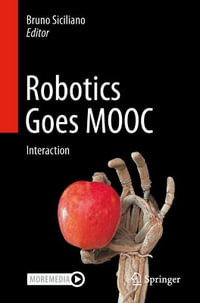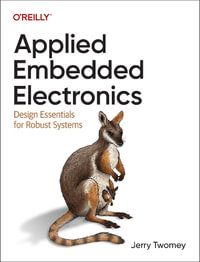
Design and Optimization of Passive UHF RFID Systems
By: Jari-Pascal Curty, Michel Declercq, Catherine Dehollain
Paperback | 29 October 2010
At a Glance
Paperback
$210.72
Aims to ship in 7 to 10 business days
When will this arrive by?
Enter delivery postcode to estimate
Radio Frequency IDentification (RFID) is an automatic identification method, relying on storing and remotely retrieving data using devices called RFID tags or transponders. An RFID tag is a small object that can be attached to
or incorporated into a product, animal or person. An RFID tag contains an antenna to enable it to receive and respond to Radio-Frequency (RF) queries from an RFID reader or interrogator. Passive tags require no internal power source, whereas active tags require a power source.
As of today (2006), the concepts of ubiquitous computing and ambient intelligence are becoming widespread. In order for these to become a reality, a number of key technologies are required. In brief, these technologies need to be sensitive, responsive, interconnected, contextualised, transparent and intelligent. RFID, and in particular passive RFID tags, are such a technology. In order to deliver the necessary characteristics that could lead to ambient intelligence, however, there are some challenges that need to be addressed.
Remote powering of the tags is probably the most important challenge. Issues concerning the antenna-tag interface and the rectifier design, that allow the RF signal to be converted to Direct Current (DC) are top priorities. Secondly, the communication link and the reader should be optimized. The RF signal that contains the tag data suffers from a power of four decay with the distance between tag and reader. As a result, both the reader sensitivity and the tag backscattered power efficiency have to be maximized. Long-range powering, as well as sufficient communication quality, are the guidelines of this work.
This work proposes a linear two-port model for an N-stage modified-Greinacher full wave rectifier. It predicts the overall conversion efficiency at low power levels where the diodes are operating near their threshold voltage. The output electrical behavior of the rectifier is calculated as a function of the received power and the antenna parameters. Moreover, the two-port parameter values are computed for particular input voltages and output currents for the complete N-stage rectifier circuit, using only the measured I-V and C-V characteristics of a single diode.
Also presented in this work is an experimental procedure to measure how the impedance modulation at the tag side affects the signal at the reader. The method allows the tag designer to efficiently predict the effect of a modulator design at the system level and gives a useful instrument to choose the most appropriate impedances.
Finally, the design of a fully-integrated, remotely powered and addressable RFID tag working at 2.45GHz is described. The achieved operating range at a 4W Effective Isotropically Radiated Power (EIRP) reader transmit power is at most 12 m. The Integrated Circuit (IC) is implemented in a 0.5 um silicon-on-sapphire technology. A state-of-the-art rectifier design is embedded to supply energy to the transponder. Inductive matching and a folded-dipole antenna are key elements for achieving this performance.
Industry Reviews
From the reviews:
"In this agile book of just 148 pages, the reader is introduced to the design of a passive RFID system operating in the UHF band. ... The book is a useful tool for the RFID UHF system designer, and can also be a valuable guide for the newcomer interested in understanding the multifaceted issues involved in the development of RFID and of its specifications." (S. Donati and T. Tambosso, Optics and Photonics News, July/August, 2007)
ISBN: 9781441941992
ISBN-10: 1441941991
Published: 29th October 2010
Format: Paperback
Language: English
Number of Pages: 160
Audience: Professional and Scholarly
Publisher: Springer Nature B.V.
Country of Publication: US
Dimensions (cm): 23.39 x 15.6 x 0.86
Weight (kg): 0.23
Shipping
| Standard Shipping | Express Shipping | |
|---|---|---|
| Metro postcodes: | $9.99 | $14.95 |
| Regional postcodes: | $9.99 | $14.95 |
| Rural postcodes: | $9.99 | $14.95 |
How to return your order
At Booktopia, we offer hassle-free returns in accordance with our returns policy. If you wish to return an item, please get in touch with Booktopia Customer Care.
Additional postage charges may be applicable.
Defective items
If there is a problem with any of the items received for your order then the Booktopia Customer Care team is ready to assist you.
For more info please visit our Help Centre.
You Can Find This Book In
This product is categorised by
- Non-FictionEngineering & TechnologyElectronics & Communications EngineeringCommunications Engineering & TelecommunicationsRadio Technology
- Non-FictionEngineering & TechnologyEnergy Technology & EngineeringElectrical Engineering
- Non-FictionEngineering & TechnologyElectronics & Communications EngineeringElectronics EngineeringCircuits & Components
- Non-FictionEngineering & TechnologyElectronics & Communications EngineeringElectronics EngineeringMicrowave Technology
- Non-FictionComputing & I.T.Computer ScienceDigital Signal Processing (DSP)
- Non-FictionEngineering & TechnologyOther Technologies & Applied SciencesApplied OpticsImaging Systems & Technology
























